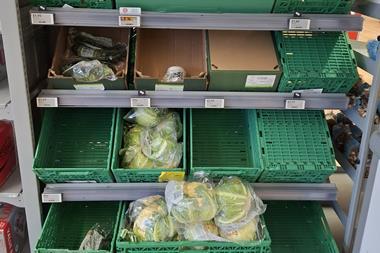Q: Congratulations again. How long did the buzz over your win last?
A: It’s still going. I went to Asda House yesterday and I took Tracey, our community colleague who has helped me with so much. I’m still getting fellow managers e-mailing me with their congratulations. It’s been manic!
Q: How does the Wembley store compare with other locations you have managed?
A:There are lots of challenges. We do a lot of trade late into the night. We are busiest between 5pm and 10pm but in the summer we can have 10 checkouts running at midnight.
A: I have a fantastic team here and all of them have a great work ethic. But the majority of our colleagues don’t have English as a first language. I’ve had some great colleagues who have done a fantastic job, but they have broken English so when they go to the Asda development centres that can hinder their progression. So I suggested that Asda trial a language course.
A: It focuses on colleagues with the ability to progress within the company but who need help with their language skills in specific shop floor situations, such as angry customers, or colleague performance reviews. At the end we’ll put them through a mock Asda development centre performance review, then measure what they have learnt and how effective the course has been.
A: This is a trial run and I really hope that it succeeds. I was so frustrated at seeing talented colleagues stumble because of their lack of English skills, so I took a personal interest in the course and forced it through. I hope at the end we can go to head office, demonstrate its success, then go again with a fresh crop of talent. You can see that the guys’ confidence is already boosted. One of the group has already broken through to be a manager. That has really helped to inspire the others.
A: This dates back to 2008. I was a store manager in Hounslow, and the store was struggling. I was walking along the high street and I went to buy a drink from a shop. It was selling 30 bays of Polish food. There was another shop up the road doing similar, so there was obviously a big demand for it in the area.
I spoke to the ethnic team at Asda House and made myself heard. I explained to them that my store was really struggling, that we needed to do something different and there was this massive Polish community here that we could really see some returns if we increased our range.
A: Andy Clarke [Asda’s chief executive] came for a store visit around that time and I said: “Andy, can I just take you up the road?” I took him to these shops, and said: “Look, this is what these two shops are selling. Imagine what we could do in our store!”
When you get Andy Clarke involved, people start paying more attention. So we were the first store to have a 10-bay Polish offering. It was a massive success and bays went into more stores. Soon after, I went into a nearby shop that was doing something like £1,000 of Polish bread a week. I trialled it in my store, put in one bay of Polish bread and it really took off. I was doing a lot of money a week just from one bay. The bread is now stocked in about 150 stores.
A: Because it is so important. Sometimes the company offer isn’t right for this store. Ninety per cent of the time it is, but the other 10% of the time we have to challenge it. You cannot run this shop like a standard shop because what sells well in a lot of core chains just won’t sell well here.
It’s about knowing you can sell a pallet of vermicelli during Eid, but you can’t sell a pallet of cranberry sauce at Christmas. You have to be on your game. And you have to be vocal with the buyers and shout “I want this, but I don’t want that.” We are at the extreme of ethnic diversity. The need to be different is acute at my store.
Q: One thing almost every winning store manager shares is the amount of time they spend on the shop floor…
A: Absolutely!
A: Because that’s what the job is. That’s where your colleagues are and that’s where your customers are. Generally speaking, at weekends I will be out on the floor 100% of the time, for weekdays, normally 80%. On the shop floor you get the buzz of the business, you get a good feeling and it gives you the confidence that you are doing the right things. You can see how the shop is trading, what is selling, see how busy the café is. It is far more effective than just seeing numbers on a screen.
A: Overall, yes. It creates challenges. Sometimes we get swamped, but other times it may put people off shopping here if there is a big event on. So from a trade perspective, it is maybe not such a good thing although we are looking at doing something special for the Olympic games next year.
A: The purpose is to train external and transitional managers. First appointment managers are here for eight weeks and the transitional managers for four. It welcomes external people into the business and allows them to learn in a non-pressurised environment. And hopefully, as the store manager, I am demonstrating the standards that they will then take back to their own shops.
And when we have external managers who have come from Morrisons, Sainsbury’s or Tesco, they really, really love what we do here!
Q&A
Age: 37
First-ever job: Was at Asda! Part time produce assistant, aged 19. How long before your first promotion? Within a year, to supervisor.
First store manager job: Aged 22 at the Burgh Heath store.
First general store manager job: Aged 35 at the Hounslow store.
Personal life: I met my wife Caroline at Burgh Heath when she was the bakery manager. My mum also works there, in the café. I have four children: Joseph, Olivia, Emily and Isabella.
Favourite Asda own-label? I love the new smoothies! They will be pushing Innocent out of some business. Ours are as good, and much cheaper.
Are your suits from George? I buy my shirts and trousers from George.



















No comments yet